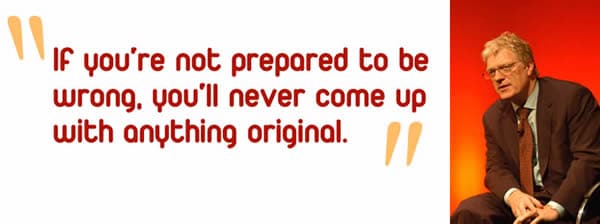Sir Ken Robinson, PhD is an internationally recognized leader in the development of creativity, innovation and human resources in education and in business. He is also one of the world’s leading speakers on these topics, with a profound impact on audiences everywhere. The videos of his famous 2006 and 2010 talks to the prestigious TED Conference have been viewed more than 25 million times and seen by an estimated 250 million people in over 150 countries. His 2006 talk is the most viewed in TED’s history. In 2011 he was listed as “one of the world’s elite thinkers on creativity and innovation” by Fast Company magazine, and was ranked among the Thinkers50 list of the world’s top business thought leaders.
Sir Ken works with governments and educations systems in Europe, Asia and the USA, with international agencies, Fortune 500 companies and some of the world’s leading cultural organizations. In 1998, he led a national commission on creativity, education and the economy for the UK Government. All Our Futures: Creativity, Culture and Education(The Robinson Report) was published to wide acclaim in 1999. He was the central figure in developing a strategy for creative and economic development as part of the Peace Process in Northern Ireland, working with the ministers for training, education enterprise and culture. The resulting blueprint for change, Unlocking Creativity, was adopted by politicians of all parties and by business, education and cultural leaders across the Province. He was one of four international advisors to the Singapore Government for its strategy to become the creative hub of South East Asia.
 For twelve years, he was professor of education at the University of Warwick in the UK and is now professor emeritus. He has received honorary degrees from the Rhode Island School of Design, the Open University and the Central School of Speech and Drama; Birmingham City University, the Liverpool Institute for Performing Arts and Oklahoma State University. He was been honored with the Athena Award of the Rhode Island School of Design for services to the arts and education; the Peabody Medal for contributions to the arts and culture in the United States, the Arthur C. Clarke Imagination Award, the Gordon Parks Award for achievements in education and the Benjamin Franklin Medal of the Royal Society of Arts for outstanding contributions to cultural relations between the United Kingdom and the United States. In 2005, he was named as one of Time/Fortune/CNN’s ‘Principal Voices’. In 2003, he received a knighthood from Queen Elizabeth II for his services to the arts.
For twelve years, he was professor of education at the University of Warwick in the UK and is now professor emeritus. He has received honorary degrees from the Rhode Island School of Design, the Open University and the Central School of Speech and Drama; Birmingham City University, the Liverpool Institute for Performing Arts and Oklahoma State University. He was been honored with the Athena Award of the Rhode Island School of Design for services to the arts and education; the Peabody Medal for contributions to the arts and culture in the United States, the Arthur C. Clarke Imagination Award, the Gordon Parks Award for achievements in education and the Benjamin Franklin Medal of the Royal Society of Arts for outstanding contributions to cultural relations between the United Kingdom and the United States. In 2005, he was named as one of Time/Fortune/CNN’s ‘Principal Voices’. In 2003, he received a knighthood from Queen Elizabeth II for his services to the arts.
Everybody has an interest in education. Education takes us into this future we can't grasp. Creativity is as important as literacy. Kids will take a chance, they're not afraid to be wrong.
I find myself especially in my art direction am fearful of creating a wrong piece of art, it's what's been holding me back from doing what I most importantly want to do. What if I portray this wrong?...
I find myself especially in my art direction am fearful of creating a wrong piece of art, it's what's been holding me back from doing what I most importantly want to do. What if I portray this wrong?...
The education department has this irrational fear of being wrong - Therefore unacceptable and is reflecting on students, a continuing downward spiral. There is nothing wrong with being wrong as it allows us to realize and reflect thus learning. As we grow older we grow out of creativity. Educating people out of their creative capacities. Picasso: All children are born artists. The problem is remaining an artist as an adult.
Education came into being to meet the needs of revolution (During industrialization) The hierarchical system emphasis Math and Languages as important and arts and music not as such. You couldn't succeed with the latter two. The most useful subjects for work placed at the top of the pyramid. It steered students away from things you wanted to do because you like them.
Academic ability has come to dominate our intelligence Universities designed the education system in their image.
Education came into being to meet the needs of revolution (During industrialization) The hierarchical system emphasis Math and Languages as important and arts and music not as such. You couldn't succeed with the latter two. The most useful subjects for work placed at the top of the pyramid. It steered students away from things you wanted to do because you like them.
Academic ability has come to dominate our intelligence Universities designed the education system in their image.
Intelligence is Diverse
Intelligence is Dynamic
Intelligence is Distinct
Rethink the fundamental principles on which we're educating our students. Celebrate the gift of human imagination.
No comments:
Post a Comment